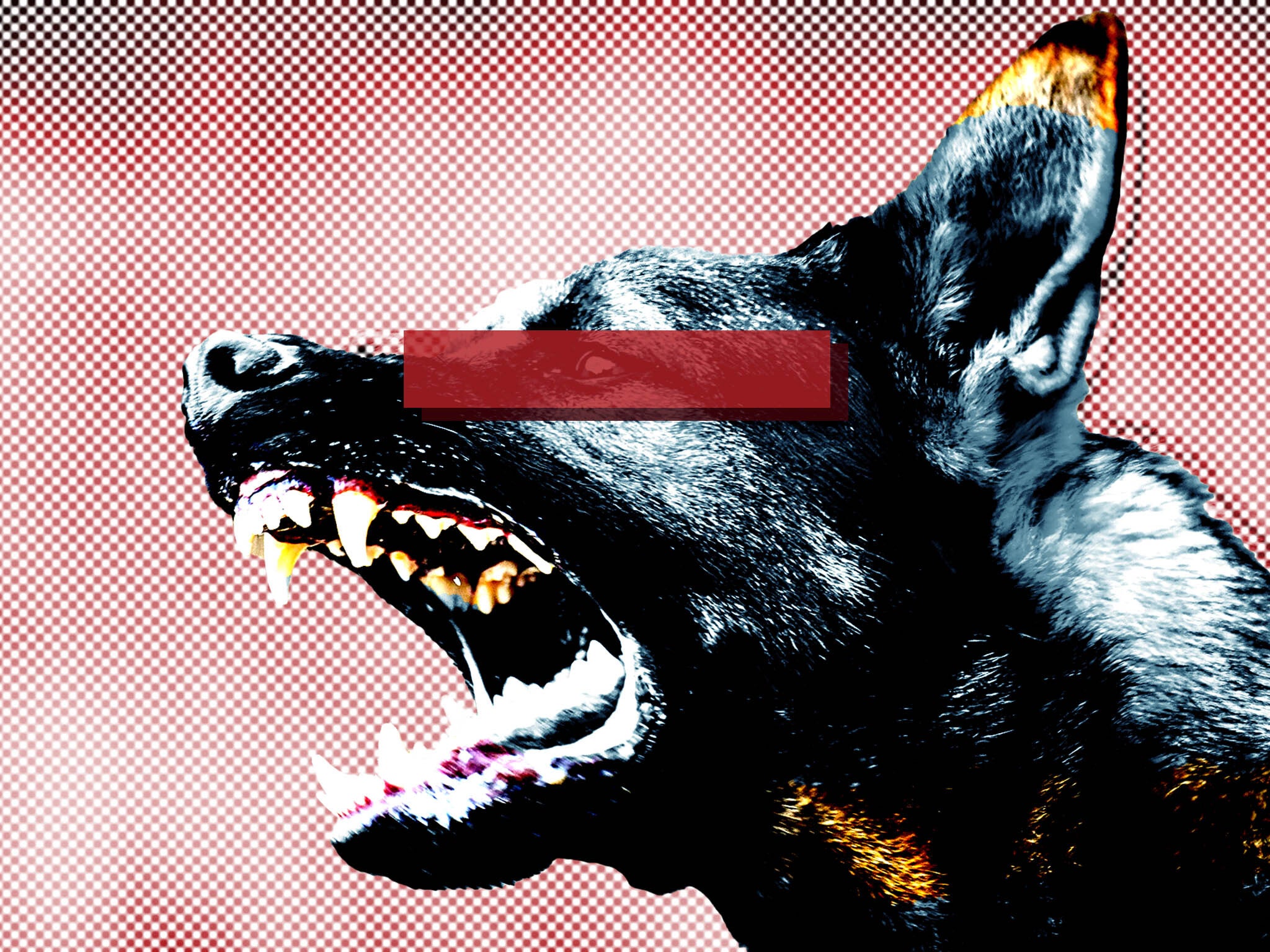Wake up, dog owners: Your pet isn’t a cuddly toy. It’s more like a grenade
When I was bitten by a large dog while walking down the street in New York, I came to understand why people are terrified of our canine companions. As a dog lover and owner myself, how was I supposed to deal with the fallout?


Your support helps us to tell the story
From reproductive rights to climate change to Big Tech, The Independent is on the ground when the story is developing. Whether it's investigating the financials of Elon Musk's pro-Trump PAC or producing our latest documentary, 'The A Word', which shines a light on the American women fighting for reproductive rights, we know how important it is to parse out the facts from the messaging.
At such a critical moment in US history, we need reporters on the ground. Your donation allows us to keep sending journalists to speak to both sides of the story.
The Independent is trusted by Americans across the entire political spectrum. And unlike many other quality news outlets, we choose not to lock Americans out of our reporting and analysis with paywalls. We believe quality journalism should be available to everyone, paid for by those who can afford it.
Your support makes all the difference.I’m a true dog lover. When asked “What do you want for Christmas?” I have, and always will, respond with: “A puppy”. I point out particularly cute dogs I spot on walks, I greet people’s pets before them, and I — disturbingly, to some — refer to my Pomeranian as “my everything”.
But then something happened that shook my faith in our canine companions.
Last year, I was in a serious e-bike accident, resulting in a traumatic brain injury and fractured skull that I'm still reeling from. A few months later, I was on my way to an ice hockey game. It was my first time going to such an event since my injury; I was stressed, tired, and in pain, so I left an uncharacteristically sincere voice note to my partner attempting to cheer myself up. A few minutes after responding, “It's all going to be great from now on, we're on the up I promise”, he got a call saying that instead of meeting at the game, he should go to the hospital.
While walking along the sidewalk, a large dog had lunged at me and took a chunk out of my arm. I didn't go to pet it; I didn't coo over it; I don't even recall looking at it. But something about me clearly wasn't to the 81lb dog's liking. Despite being on a leash, it managed to grab and latch on to me until I was able to break free and run into the road. It later came to my attention that it wasn’t the first time the dog had bitten someone.
Months later, I have a gnarly scar, some pain and weakness, but by far the most upsetting part is how my relationship with dogs has changed.
Crossing the street upon seeing a particularly large or rowdy one is now commonplace. I smile through gritted teeth when someone says, “Oh don’t worry, he’s harmless.” Despite the fact that she’s the size of a Beanie Baby and the friendliest animal I’ve ever met, I hold my own dog on a tight leash when passing people as I couldn’t imagine anything worse than her biting someone.
Ironically enough, dogs now routinely lunge or bark at me because of my frightened behaviors, which was a rarity before.
“It’s not in your head — dogs can smell fear,” dog trainer and television presenter, Victoria Stilwell, told me. “When people are cynophobic and there’s a dog in the distance, your heart will start to pump a little faster, you’ll start to sweat a bit more, your breathing will get a little lessened, your pupils will dilate, that adrenalin that starts to go through your body, the dog will smell it.”
“I’m not surprised you’re scared of dogs now. It’s really important that you’re scared of dogs. Your body is telling you that in order for you to survive.”
Despite being world-famous for her love of dogs, Victoria is also a bite victim. While filming a TV show in Alabama, she was attacked by a large police dog. The plan was that she would sit in a helicopter, and a leashed police dog and its handler would jump in with her. Safety checks would be done, then they would fly around until the dog would jump out and run after a decoy, getting great shots for the show: “I was like ‘Are you sure? Are you sure this dog is gonna be okay?’ They said it’ll be totally fine, and it wasn’t. He came in, the Malinois leapt in — a full-on, full-trained, wound-up beautiful Malinois — and bit my leg. Thank God he didn’t get an artery.”
“It’s as traumatic as someone stabbing you with a knife. And I really want people to understand that. You don’t minimize when a child has been bitten, when an adult has been bitten, however hard that bite was.”
Just under 40 percent of American households own a dog, with ownership increasing by nearly 11 percent during the Covid-19 pandemic. In 2021, 81 Americans were killed by dogs, according to the CDC. This was up from 62 in 2020, 48 in 2019, and 35 in 2018. There were an estimated 322,177 emergency department visits due to non-fatal dog bites across the US in 2020. According to the New York Health Department, there have been 14,303 emergency department visits in the state for dog bites since 2020.
The question of why dogs bite has been constantly on my mind since I was attacked by one. Previously, I hadn’t thought much about it beyond ‘some dogs are good, and some are bad’ — but of course that isn’t nearly complex enough.
“Violence is not actually the norm in the dog world,” Victoria says. “When a dog aggresses, it’s trying to change the behavior of the perceived threat. And most of the time dogs are very successful at it, because they bark and lunge and growl, or they snarl, or lift their lips, and people and other dogs most of the time go ‘Okay!’ and back away.”
Victoria explains that studies and observations show the reaction is rooted in a deep insecurity in the dog, and it likely has not been raised or socialized properly.
However, she suggests my attack may have come from a different place. “The reason why I think this attack was far more sinister is because this dog was not — it seems — biting you to increase distance. This seemed to be a bit more of a predatory attack … If you hadn’t got away, and the person hadn’t been there, I think the attack would’ve continued.
“This kind of attack is not normal in the dog world. It’s abnormal to have an attack where you’re not doing anything and you’re just walking across the street, and the dog is leashed, and the dog suddenly lashes out; you’ve done absolutely nothing except walk.”
For the safety of not only humans but other animals and the dogs themselves, it is vital for people to understand potential warning signs in their pets. As subtle as they may seem, attacks do not happen apropos of nothing; there are signals you can learn to stop behavior from escalating to the level that Victoria or I experienced.
I had expected the signs of an impending attack to be snarling, growling or lunging, but that isn’t what concerns Victoria most. It is, in fact, an “aloofness” that she says we should watch out for. Lesser-recognized signals a dog may be about to turn aggressive include “an unwillingness to go up and greet people, to socialize, a stiffness, a discomfort. I would rather have a gregarious dog jumping all over me; aloof dogs, I really respect them and what they want to say by not wanting to interact with me.”
Other physical signs to look out for are lip-licking, itching, sneezing, turning their head and body away from people, and body sensitivity, says Victoria: “Also if your dog is really prey-driven — it has attacked or killed an animal — then you cannot have that dog around animals or small children.”
When a dog is about to bite, there is one behavior that Victoria says to look out for in particular. She calls it body-freezing. “So what I’ll see is the tail quivers, or wags really fast, and it’s quite tense — so is the body. There’s either a long freeze as the dog watches you come towards it, or there’s a micro-freeze — very, very still — then the dog goes. And it can be less than a second [between that freeze and the bite].”
The question is not about fault or blame, but rather solutions. Dog ownership is common, and it’s inevitable that you’ll encounter dogs in your day-to-day life in most US communities. And whether you like them or not, the simple fact is that they are wild animals. “We domesticated these animals and brought them into our homes, but they’re predators, with very sharp teeth, and they’re now living in our weird world, and they’re picking up our anxieties,” says Victoria. “They’re living confined lives in our homes with not much choice; it’s very disempowering.”
As a dog owner myself, I know the temptation is to believe that our pets are a friendly cuddly toy, rather than a potential grenade. But being realistic about them is the first step to making human-dog interaction safe for everyone.
Being more cognisant of our dogs and their behavior is an important start, but since my attack, I’ve been pondering whether it’s enough. Is it fair or even safe to have large dogs as pets in cities? Should people receive education on owning animals at school? The welfare of animals is hugely critical, but are we forgetting the safety of people around them? Perhaps, as we have drivers’ licenses, should we demand similar certification for certain breeds or sizes of dogs?
For those who are nervous around dogs generally, Victoria suggests adopting a relaxed stance, breathing deeply, and focusing on something else. “Don’t look at the dog — just look at your phone, get a magazine, just anything to take your focus away. That’s going to keep your body more relaxed and fluid, and then the dog is going to react to you less. And you can also chew gum, because that can interrupt the smell [of fear that you’re giving off].”
Excuse me while I go out and buy a lifetime’s supply of minty gum.
Victoria Stilwell runs the Victoria Stilwell Academy for Dog Training and Behavior (VSA) . Her new show, The Dog Academy, airs soon on Channel 4 in the UK
This article was originally published in March 2023

Join our commenting forum
Join thought-provoking conversations, follow other Independent readers and see their replies
Comments